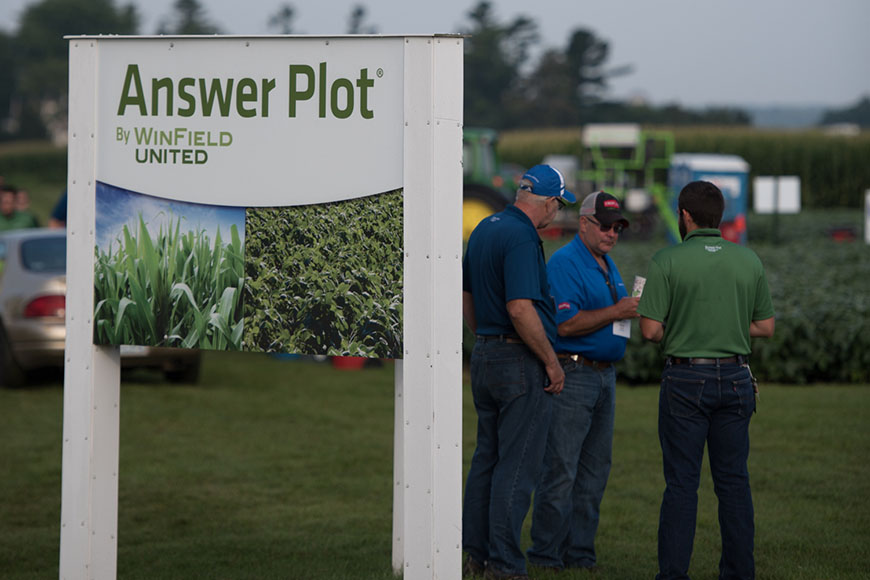2017 Answer Plot® Insight #1: Belowground Traits Beat Corn Rootworm

This is the first in a series of four posts highlighting key insights from 2016 Answer Plot® field data and trials.
The injury caused to corn plants by corn rootworms can be devastating. There are several ways to reduce corn rootworm populations and help minimize the injury caused, including using an in-furrow insecticide, using an insecticide to eliminate adult beetles, or by planting hybrids with belowground traits.
Hybrids with belowground traits provide the most consistent control of corn rootworm because the effectiveness of insecticides is based on weather patterns and on the timing of the emergence of rootworm beetles. Smart hybrid selection can help minimize risk and maximize the potential for success.
Answer Plot® data demonstrates that Genuity® SmartStax® corn hybrids deliver consistent yield advantage compared to hybrids without belowground traits. In 2016 trials, even with an in-furrow application of Capture® LFR® insecticide, Genuity® SmartStax® hybrids outperformed hybrids without belowground traits across all locations and performed even better in locations that were under insect pressure.*
With increasing rootworm populations, think about the risks of not choosing hybrids with corn rootworm traits. In fields at risk for corn rootworm infestations, we recommend you consider planting hybrids with belowground traits to provide consistent protection compared to insecticide applications alone.
In 214 comparisons performed across all Answer Plot® locations, Genuity® SmartStax® corn hybrids showed a 4.9-bushel-per-acre yield advantage over Genuity® VT Double PRO® corn hybrids: 225.9 bu/A vs. 221.0 bu/A.

In 92 comparisons performed at Answer Plot® locations with corn rootworm pressure, Genuity® SmartStax® corn hybrids showed a 5.5-bushel-per-acre yield advantage over Genuity® VT Double PRO® corn hybrids: 237.7 bu/A vs. 232.2 bu/A.

*Because the primary objective is to look at genetic performance, standard agronomic practice is to apply an insecticide to genetic trials to manage the potential variation from belowground pests.
Results may vary. Because of factors outside of Winfield Solutions’ control, such as weather, product application and any other factors, results to be obtained, including but not limited to yields, financial performance or profits, cannot be predicted or guaranteed by Winfield Solutions.
The injury caused to corn plants by corn rootworms can be devastating. There are several ways to reduce corn rootworm populations and help minimize the injury caused, including using an in-furrow insecticide, using an insecticide to eliminate adult beetles, or by planting hybrids with belowground traits.
Hybrids with belowground traits provide the most consistent control of corn rootworm because the effectiveness of insecticides is based on weather patterns and on the timing of the emergence of rootworm beetles. Smart hybrid selection can help minimize risk and maximize the potential for success.
Answer Plot® data demonstrates that Genuity® SmartStax® corn hybrids deliver consistent yield advantage compared to hybrids without belowground traits. In 2016 trials, even with an in-furrow application of Capture® LFR® insecticide, Genuity® SmartStax® hybrids outperformed hybrids without belowground traits across all locations and performed even better in locations that were under insect pressure.*
With increasing rootworm populations, think about the risks of not choosing hybrids with corn rootworm traits. In fields at risk for corn rootworm infestations, we recommend you consider planting hybrids with belowground traits to provide consistent protection compared to insecticide applications alone.
In 214 comparisons performed across all Answer Plot® locations, Genuity® SmartStax® corn hybrids showed a 4.9-bushel-per-acre yield advantage over Genuity® VT Double PRO® corn hybrids: 225.9 bu/A vs. 221.0 bu/A.

In 92 comparisons performed at Answer Plot® locations with corn rootworm pressure, Genuity® SmartStax® corn hybrids showed a 5.5-bushel-per-acre yield advantage over Genuity® VT Double PRO® corn hybrids: 237.7 bu/A vs. 232.2 bu/A.

*Because the primary objective is to look at genetic performance, standard agronomic practice is to apply an insecticide to genetic trials to manage the potential variation from belowground pests.
Results may vary. Because of factors outside of Winfield Solutions’ control, such as weather, product application and any other factors, results to be obtained, including but not limited to yields, financial performance or profits, cannot be predicted or guaranteed by Winfield Solutions.


